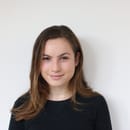Jumping out at me from the uniform rows of book spines, The Death of American Virtue stares me down. I stare back, not about to resign myself to the victory of inanimate pages within a leather cover. My posture is rigid, induced by the miniature yellow stool: the perfect stature for winning a staring contest. I am slightly cramped, with my knees coming up to my chest— this stool is far too small for a girl of average size. Having stooped down, I have been confronted at eye level by this rather daunting title. For some reason, this tiny chair has been situated within the section containing political philosophy texts, hardly a topic fit for a very young person. I suppose it’s never too early to get a head start on philosophy.
The used bookstore and coffee shop is situated within a big brick building— one of those charming, ancient former banks or general stores from the 1800’s. It’s recently been renovated with sleek floor-to-ceiling windows that let in the light and transform the storefront into the facade of a contemporary boutique rather than a used bookstore. The logo has been redesigned as well, with a quirky blue cubist twist painted over the original hanging wooden sign. The name of the cafe remains unchanged: The Book Trader— a reminder of the traditional splendor that you can still glimpse inside.
When you happen upon the café, the distinct, ambrosial scent of coffee and old books smacks you in the face, albeit gently. The café counter can be found straight ahead, flanked by two spaces adjacent to either side of the entryway. Turning left takes you into the used bookstore, a wonderland of towering bookshelves, each filled to the brim. The lighting is dim and flickery, either as an aesthetic choice or the result of an only partial renovation. While the books make their presence known by overflowing from all around, the little used bookstore is rather devoid of people. You make company with the books instead.
You set your things down and perch on a plastic barstool in the room of windows, facing the cluttered outside patio. Your table is greenish blue linoleum, a smooth zone to prop open your laptop. The window reveals a splendid view of the outside patio, where a dozen or so people sit lazily around their own greenish blue tables. The charming courtyard fits snugly within the space between the coffee shop and the nextdoor building, a little tucked away spot, easily missed from the street. Earthy reds and greens are everywhere, with little cheerful plants sprouting up in between floor tiles and elegant ivy-covered stones of the opposite wall. On this wall, vertical windows from the building next door survey the courtyard. They are sightless eyes, obscured by the heavy curtains which hang inside them, blocking the view of whoever resides there. If the residents inside were to remove these curtains, they would notice a sea of Apple computers and the frazzled students and businesspeople behind them, trying to take a break from the dreadful monotony of office and classroom life by venturing out to a relaxing coffee shop.
Two massive faces smile down from posters hanging next to the rectangular windows, reigning over the courtyard. Their features are splashes of black and white paint— chiaroscuro, but make it modern. New Haven Notables, Karen Carpenter and Robert Moses.
“Be notable,” they say.
“We’re trying,” the crowd responds.
You look around at the people. There is overwhelming similarity. Apple logos and fingers flying. Paper cups. Stressful energy. For a moment, everybody is the same— everybody here came for inspiration, to learn, to be notable. Maybe they could learn something about inspiration from one of those texts in the empty bookstore.
In one of those unopened books, social philosopher Simmel tries to tell us that as individuals try harder and harder to be “unique”, then “unique” eventually becomes the new “same.” To an observer of this sea of similarity, of people stuck in the cycle of work and life, this philosophy seems as if it could be appropriate.
I return to this coffee shop a few days later and realize that Simmel may have been wrong. In the seats which once housed some hungover business students, a girl and her grandfather enjoy a late afternoon chat. They have the same brown eyes and the same soft facial structure. Although differences in age and gender diverge the rest of their appearance, the essence of family exists in every mannerism. The pair hold notebooks and pens rather than computers. They look each other in the eye and they talk. They are genuine, with the bright, cheerful smiles that illuminate the faces of those who really seem to care. It’s later in the day than it was during my last visit, and the sun is obscured behind the tall brick building with the windows and posters. While the sun hides, the patio has never seemed brighter.
Individuality burns like the setting sun within this place. It floods into the bookstore and the atrium, permeating the quirky café with the glow of the evening. Inside the perceived monotony and conformity of everyday life, there are bits of individuality scattered about, hidden within shelves and within people. Reunited best friends enjoy a study date while giggling and gushing about their lives over the past months. A boy with dyed red hair and metallic nail polish converses excitedly with his friend, looking genuinely happy. A woman with an exquisite woven headdress leans up against a shelf of books, with eyes closed, as if absorbing the words through the spines of the novels. Apple computers and flying fingers are just a facade— a facade that only partially obscures the wonderful distinctiveness of every café frequenter.
After finishing my coffee, I stroll through the used book store one last time. This is when I discover the little yellow child’s stool, situated in the back corner among the political philosophy novels. Taking the time to sit upon this stool has presented me with a challenge. I lose the staring contest with the unopened book. I pick the novel up. I open it.



